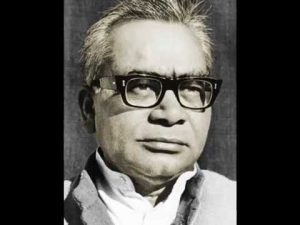On 12 October 1967, freedom fighter and socialist leader Dr. Ram Manohar Lohia passed away in New Delhi aged 57. This edition of ‘This Day in History’ will give details about Dr. Ram Manohar Lohia within the context of the IAS Exam.
| Get an edge in one of the most toughest competitive exams in the country by visiting the UPSC Previous Year Question Papers page.
Enhance your preparation for the UPSC exam by checking the following links: |
Biography of Dr. Ram Manohar Lohia
- Ram Manohar Lohia was born at Akbarpur, Uttar Pradesh on 23 March 1910 to a prosperous family. He was brought up by his father Hiralal as his mother died when he was just two.
- He was an excellent student and stood first in his school matriculation exam. He secured a BA degree from the University of Calcutta in 1929. After that, Lohia went to Frederick William University in Germany (today known as Humboldt University of Berlin). There he acquired a PhD in national economy. His doctoral thesis was on salt taxation in India.
- Lohia was noticed by the political circles in India when he wrote letters to several news agencies in Europe against the Maharaja of Bikaner representing Indian in the League of Nations.
- On returning to India, he joined the Indian National Congress. He also played a huge role in founding the Congress Socialist Party. He was appointed the first Secretary of the All India Congress Committee’s (AICC) foreign affairs department.
- He was arrested in 1940 for making anti-war speeches.
- Lohia participated in the Quit India campaign.
- He was arrested again in 1944 and incarcerated in the Lahore Prison before being released in April 1946.
- He was staunchly against partitioning the country. He was an ardent follower of Mahatma Gandhi.
- After the country gained its freedom, Lohia became an important political leader. He was one of the first to introduce the idea of unifying the princely states to form states.
- Lohia favoured the use of Hindi as the official language of India. In his own words, “The use of English is a hindrance to original thinking, progenitor of inferiority feelings and a gap between the educated and uneducated public. Come, let us unite to restore Hindi to its original glory.”
- Realizing the hindrance poverty would be to development and the making of a strong nation, he encouraged the people to voluntarily come forward and engage in the construction of roads, canals and wells.
- He was famously against upper-caste dominance and was instrumental in creating 60% reservation of seats for minorities, women and the backward classes in the legislature.
- He also wished to do away with private schools in the country and wanted everyone irrespective of class and caste to get educated in upgraded government schools. He believed this would eradicate divisions in society.
- His anti-English and pro-reservation policies did make him unpopular among some people in the political circles. He did not also shy away from criticizing the then Prime Minister Jawaharlal Nehru of whom he wrote in a pamphlet titled ‘25000 rupees in a day’, that the money spent on the PM on a single day was way more than what India could then afford.
- Lohia also advocated the overthrow of despotic rule in Nepal as well as the Goan liberation from Portuguese rule.
- In his last few years, he was against the Congress as he felt that there was a need for divergent political parties to come to power and that excess clout in one party was detrimental to the country.
- Lohia died in New Delhi aged 57.
Also on this day
1492: Italian explorer Christopher Columbus arrived in the Americas. This day is celebrated in some countries as ‘Columbus Day’. There are objections to celebrating this day as this event led to the eventual colonization, exploitation and slavery in the continents.
1871: British government passed the Criminal Tribes Act which named over 160 communities as ‘criminal’. The Act was repealed in 1949.
1967: Jammu & Kashmir’s National Conference unanimously passed a resolution for a permanent merger of J&K with India.
1993: The National Environment Council set up with the Prime Minister as the chair.
1999: Pervez Musharraf assumed power in Pakistan in a coup.
Dr Ram Manohar Lohia:- Download PDF Here
See previous ‘This Day in History’ here.
For more articles and UPSC preparation material follow the links given in the table below:
Related Links

Comments